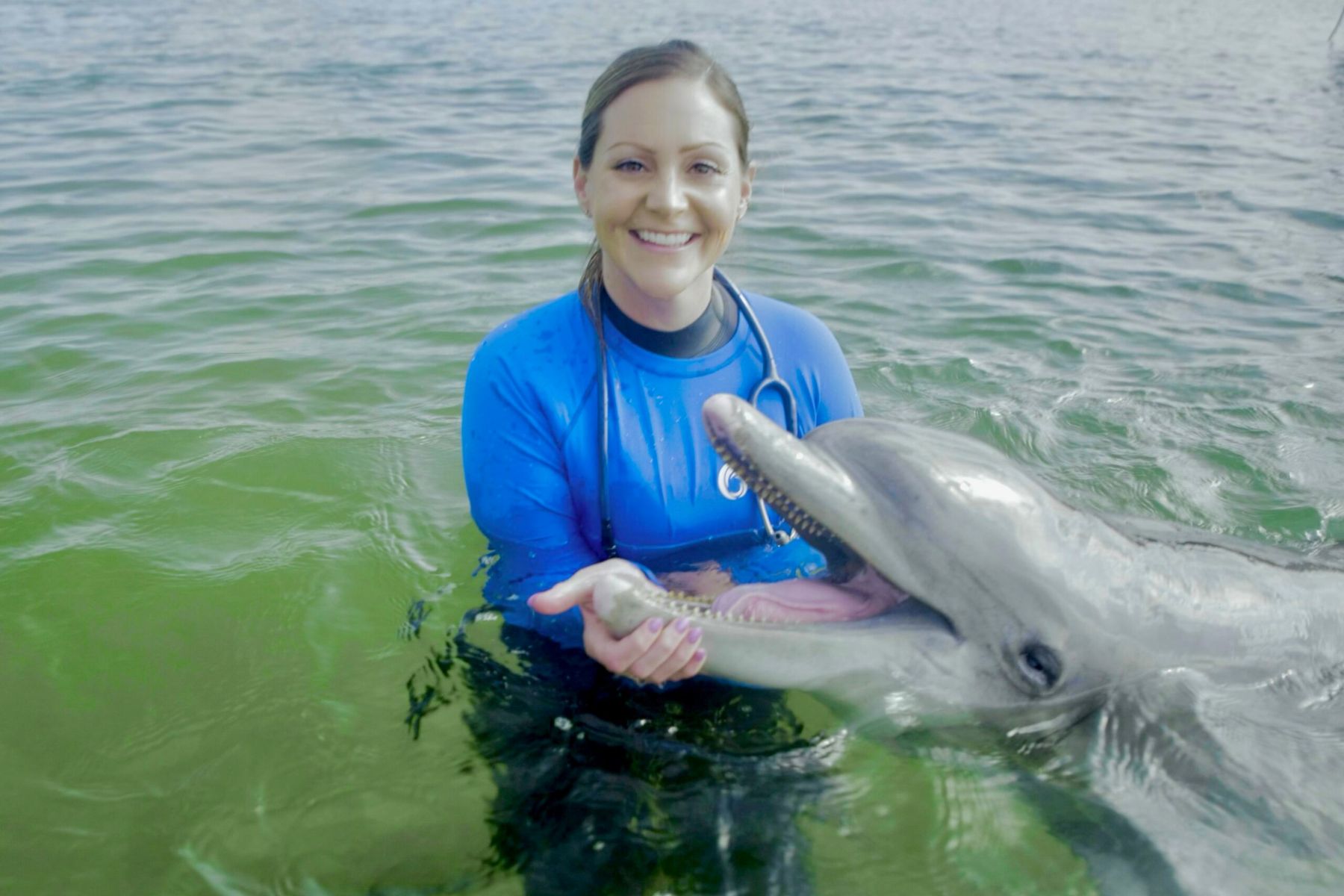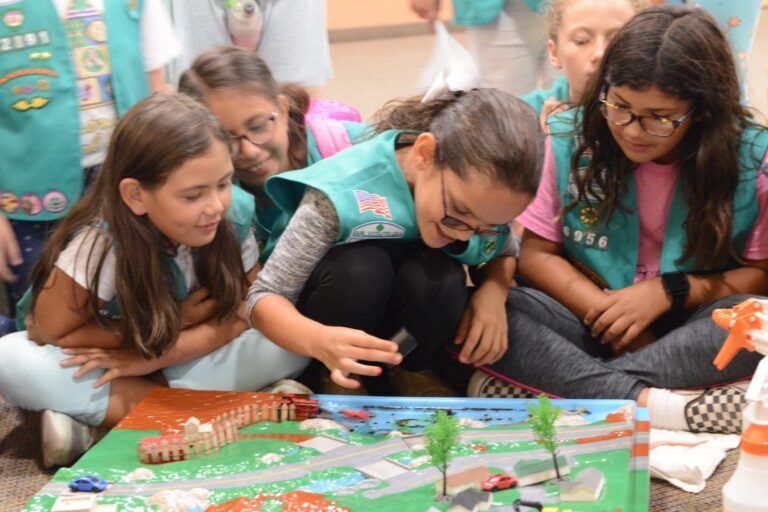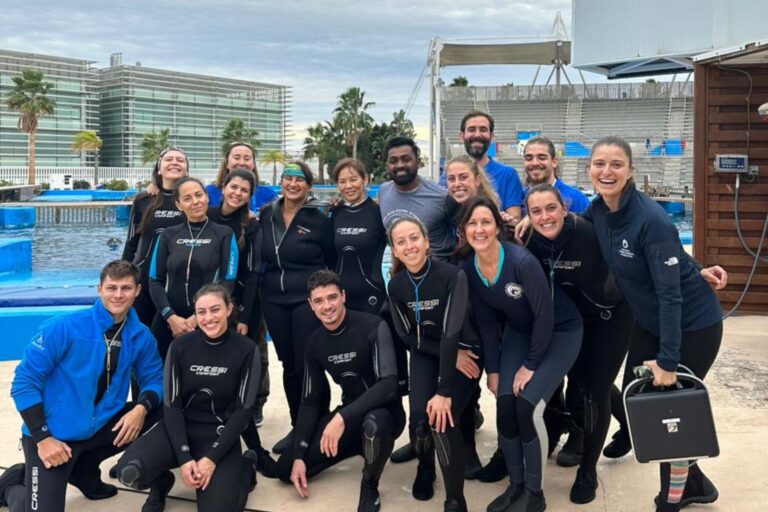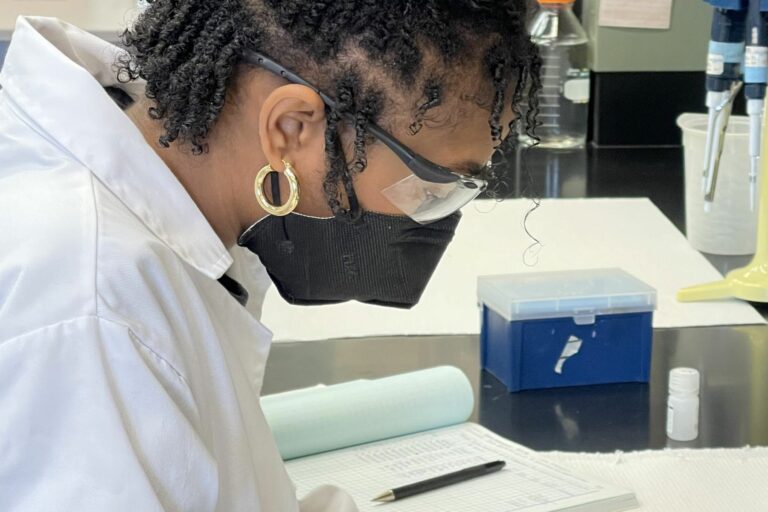BY LINDA STEWART, MARCH 2024. Original article posted in the Microbiologist.
Scientists have successfully carried out pioneering fecal microbiota transplantations on Navy bottlenose dolphins that showed signs of gastrointestinal disease.
One dolphin in particular who was outwardly ill was able to be taken off medication during the treatment course, with his appetite and energy returning to normal, according to the team at the National Marine Mammal Foundation.
The project was carried out jointly between the NMMF, the U.S. Navy Marine Mammal Program and the Gilbert Lab at UCSD School of Medicine and Scripps Institution of Oceanography, and its findings were published in the Journal of Applied Microbiology, an Applied Microbiology International publication.
Bottlenose dolphins with evidence of gastrointestinal disease were treated with fecal microbiota transplantations, and the changes to their gut microbiome were analyzed using metagenomic sequencing, corresponding author Dr Barb Linnehan said.

Dr. Barb Linnehan examining a Navy dolphin. Photo credit: U.S. Navy
First of its kind
The paper is the first of its kind to describe the use of fecal microbiota transplants (FMTs) in dolphins in peer-reviewed literature. Prior to this work, there were only a handful of anecdotal cases of FMT use in marine mammals and there were no standardized methods to safely screen donors, effectively administer, or monitor its efficacy.
“This work is important to the veterinary community because it highlights a therapeutic option other than antibiotics to effectively treat gastrointestinal diseases in cetaceans, and describes a safe and effective protocol to alter the gut microbiome in animals with dysbiosis,” Dr Linnehan said.
“It was important to us to be as thorough and careful as possible to ensure safety of the dolphins as our top priority.
“In an effort to continually advance marine mammal medicine, we conducted this pilot project, pushing the boundaries in an area that had not been rigorously explored yet. There are numerous applications of FMTs beyond gastrointestinal disease, and this therapy holds so many future possibilities to investigate.”
Non-antibiotic option
Gastrointestinal disease is common in many animals, including wild and managed dolphins, and FMTs offer a non-antibiotic option aimed at restoring beneficial gut flora in dysbiotic animals. While FMT literature abounds in the human medical realm, there are only a handful of veterinary FMT studies published to date, across a variety of species.
The conception of this project was a collaboration between Dr. Maureen Carroll, a veterinary internal medicine doctor, and Dr. Barb Linnehan, a marine mammal veterinarian who was mentored by Dr. Carroll during her veterinary internship. At Angell Animal Medical Center in Boston, Dr. Carroll frequently uses FMTs to treat dogs with GI illnesses with great success.
When Dr. Linnehan was treating a Navy dolphin with dysbiosis, she reached out to Dr. Carroll to help extrapolate an FMT protocol for use in dolphins, based on the human and veterinary standards.
The first Navy dolphin who was treated with FMTs showed significant improvement and no longer required medications to manage GI illness. The success of this first pilot case is what led to this clinical project in collaboration with the Gilbert Lab, to more formally evaluate the science behind the dolphin FMTs.
Gut flora
The team first measured the baseline bacterial composition of dolphin fecal samples prior to any FMT treatments.
“We compared the gut flora from recipient dolphins, with histories of early antibiotic use and gastrointestinal disease, to the gut flora of the healthy donor dolphins,” Dr Linnehan said.
“With metagenomic analysis and comparison of these two groups of dolphins, we were interested to see if there was a distinct profile of a healthy dolphin gut microbiome versus a sick dolphin gut microbiome.
“We were surprised at this stage to see that each dolphin varied widely, and there was not a clear pattern in species present or abundances of certain species of microbes that described sick vs healthy dolphins – each dolphin was unique in microbial composition.
“However, there were also common ‘core’ microbial members that were found across a majority of the dolphins, including an unexpected strain from the bacterial phylum Candidatus Kryptonia which is typically associated with geothermal spring environments.”
Eight treatments
The researchers then performed eight FMT treatments on four recipient dolphins by combining thoroughly screened feces from healthy donor dolphins and giving it to the recipient dolphins trans-rectally.
“Importantly, we saw no adverse effects in the recipients. With shotgun metagenomics, we were also able to observe the engraftment of new donor species to the recipient microbiome following FMTs,” Dr Linnehan said.
“The degree of engraftment varied with each recipient dolphin. The dolphin who was outwardly ill at the beginning of the FMTs had the most dramatic response; he was successfully taken off of all medications and his appetite and energy returned to normal during the treatment course. The dolphin’s improved clinical outcomes coincided with increased microbial diversity following the FMT treatment.
Banking healthy feces
“During the project, we also came up with an effective protocol for banking healthy donor dolphin feces for later use. This has proven beneficial so that when an FMT is needed we have a healthy dolphin stool bank to pull from.”
This project was an important first step and building block for future studies to build upon, so that dolphin gut microbiome and FMT therapy science can advance, Dr Linnehan said.
“We’ve shown that FMTs can be done safely in dolphins and that they can be very effective in animals with gastrointestinal disease and dysbiosis,” she said.
Antimicrobial resistance
“As antimicrobial resistance and antimicrobial stewardship are hot topics in the medicine world, having this non-antimicrobial option as a therapeutic tool can be helpful for marine mammal veterinarians. These tools and techniques could also be applied to wild animals in rehabilitation settings, to include at-risk, threatened, and endangered dolphins.
“This study was just the beginning of exploring the use of FMT and microbial changes over time in the dolphin gut. As this was a small, clinical study that was disrupted by the global pandemic, future studies with larger sample sizes and over a longer time period are warranted.
“It would also be interesting to investigate gut microbiome changes with different diet composition (i.e. different fish types), during different times of year, or fluctuations with other external factors like environmental water quality. There are also numerous opportunities to investigate FMT for treatment of non-GI disorders as documented in other species, including behavioral conditions or to improve longevity.”
Marine mammals
The project was spearheaded by Dr. Barb Linnehan (veterinarian and Director of Animal Health and Welfare) at the National Marine Mammal Foundation with the help of Dr. Jack Gilbert and his laboratory team, including Sho Kodera (co-first-author, PhD student in marine biology at Scripps Institution of Oceanography). As part of the San Diego, CA based non-profit organization, the National Marine Mammal Foundation, Dr. Linnehan helps provide medical care to the U.S. Navy’s marine mammals. The Gilbert Lab is a highly interdisciplinary research group at UCSD’s Scripps Institution of Oceanography and the Department of Pediatrics, where they conduct research in medical and environmental microbiology, microbial ecology, and biotechnology development.
The project was funded as part of clinical care at the U.S. Navy Marine Mammal Program.
’Evaluation of the safety and efficacy of fecal microbiota transplantations in bottlenose dolphins (Tursiops truncatus) using metagenomic sequencing’ is published in the Journal of Applied Microbiology.
Notes to editors
1. The National Marine Mammal Foundation (NMMF) is a 501(c)(3) nonprofit organization recognized globally as a leader in marine mammal science, medicine, and conservation. Their team of experts is answering critical questions about the health of the world’s marine mammals and the ecosystems they rely on. The NMMF has a mission to improve and protect life for marine mammals, humans, and our shared oceans through science, service, and education. They advance their mission by conducting innovative research and collaborating with the world’s top scientists and institutions to translate their research into applicable medicine and species conservation. The NMMF provides technical, medical, and scientific expertise to help solve problems related to conservation medicine, human-made environmental change, and endangered species recovery.
2. Applied Microbiology International (AMI) is the oldest microbiology society in the UK and with more than half of its membership outside the UK, is truly global, serving microbiologists based in universities, private industry and research institutes around the world. AMI provides funding to encourage research and broad participation at its events and to ensure diverse voices are around the table working together to solve the sustainability development goals it has chosen to support. AMI publishes leading industry magazine, The Microbiologist, and in partnership with Oxford University Press, publishes three internationally acclaimed journals. It gives a voice to applied microbiologists around the world, amplifying their collective influence and informing international, evidence-based, decision making.
3. Oxford University Press (OUP) is a department of the University of Oxford. It furthers the University’s objective of excellence in research, scholarship, and education by publishing worldwide. OUP is the world’s largest university press with the widest global presence. OUP publishes more than 500 academic and research journals covering a broad range of subject areas, two-thirds of which are published in collaboration with learned societies and other international organizations. It has been publishing journals for more than a century and, as the world’s largest university press, has more than 500 years of publishing expertise.
JOURNAL
Journal of Applied Microbiology
DOI
SUBJECT OF RESEARCH
Animals
ARTICLE TITLE
Evaluation of the safety and efficacy of fecal microbiota transplantations in bottlenose dolphins (Tursiops truncatus) using metagenomic sequencing
ARTICLE PUBLICATION DATE
1-Feb-2024
Disclaimer: AAAS and EurekAlert! are not responsible for the accuracy of news releases posted to EurekAlert! by contributing institutions or for the use of any information through the EurekAlert system.





